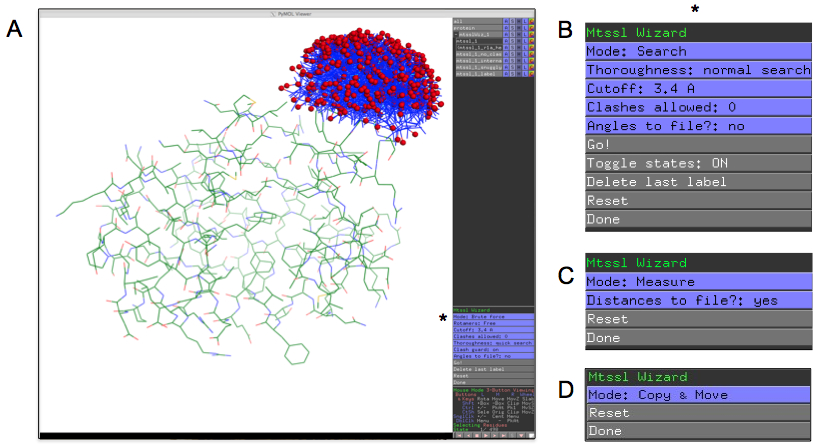MtsslWizard: Difference between revisions
| Line 51: | Line 51: | ||
#Open a protein structure in PyMOL and remove any unwanted solvent molecules or ligands. | #Open a protein structure in PyMOL and remove any unwanted solvent molecules or ligands. | ||
#Start the mtsslWizard via Wizards>mtsslWizard | #Start the mtsslWizard via Wizards>mtsslWizard | ||
#If needed, vary the search parameters like " | #If needed, vary the search parameters like "Speed" and "vdW restraints". Speed determines how many conformations of the label will be generated and checked for clashes. The 'vdW restraints' parameter determines how stringent conformations are checked for clashes with the macromolecular surface. | ||
#click " | #click "Search conformers" to start the calculation. | ||
===Distance calculation=== | ===Distance calculation=== | ||
#change "Mode" to "Distance" | #change "Mode" to "Distance" | ||
Revision as of 11:58, 31 January 2013
| Type | PyMOL Plugin |
|---|---|
| Download | plugins/mtsslWizard.py |
| Author(s) | Gregor Hagelueken |
| License | - |
| This code has been put under version control in the project Pymol-script-repo | |
mtsslWizard
mtsslWizard is a PyMOL wizard for in silico spin labeling of proteins.
News
2013-01-31:
Version 1.1 uploaded - should be available soon.
Some new features:
- Much faster. The algorithm was optimized and the speed of the program is now almost independent on the size of the molecule. Due to this, 'thorough search' is now set as default and the 'copy and move' mode has been dropped.
- New spin labels. The program now contains MTSSL, PROXYL and two labels for nucleic acids. Additional spin labels can be added upon request.
- Distances and histogram are directly copied to the clipboard or written out to a file as before.
- Improved interface. Amongst other things, the clash control settings were simplified: There are now only two settings for vdW restraints: 'tight' and 'loose'. Also,only the average and c-Beta distances are displayed in the PyMOL viewer to make it easier to read of the values.
The new version was thoroughly tested. I case of problems, please use the contact address below.
Version 1.0 will still be available in the repository.
Program features
Spin labels can be attached to any position of a protein or nucleic acid just by pointing and clicking. The program then searches the conformational space of the label and determines which conformations of the label do not clash with the macromolecule. In "distance mode", distances between label ensembles can be determined and exported.
Please reference:
Screen shot
Usage
Installation
Install the program by copying the code from the link above into an empty text file (e.g. "mtsslWizard.py") located in the \Pymol\modules\pmg_tk\startup directory. After PyMOL has been started, the program can be launched from the WIZARDS menu. Alternatively install the wizard via the plugins menu.
mtsslWizard has been tested with PyMOL 1.5.
Additional requirements:
- SciPy has to be installed for v1.1
- On some systems pyperclip or xerox have to be installed for the clipboard support.
Labeling
- Open a protein structure in PyMOL and remove any unwanted solvent molecules or ligands.
- Start the mtsslWizard via Wizards>mtsslWizard
- If needed, vary the search parameters like "Speed" and "vdW restraints". Speed determines how many conformations of the label will be generated and checked for clashes. The 'vdW restraints' parameter determines how stringent conformations are checked for clashes with the macromolecular surface.
- click "Search conformers" to start the calculation.
Distance calculation
- change "Mode" to "Distance"
- click the first and second ensemble
- The program will now calculate all possible distances between the conformations in the two ensembles. If both ensembles have many conformations, this can take quite a while!
Reference
If you find this program useful, please cite this paper:
Hagelueken G, Ward R, Naismith JH, Schiemann O (2012) MtsslWizard: In silico Spin-Labeling and Generation of Distance Distributions in PyMOL. Appl. Magn. Res. accepted for publication
It also contains detailed informations about the program, examples and a discussion of limitations of the approach.
Contact
hagelueken'at'pc.uni-bonn.de
